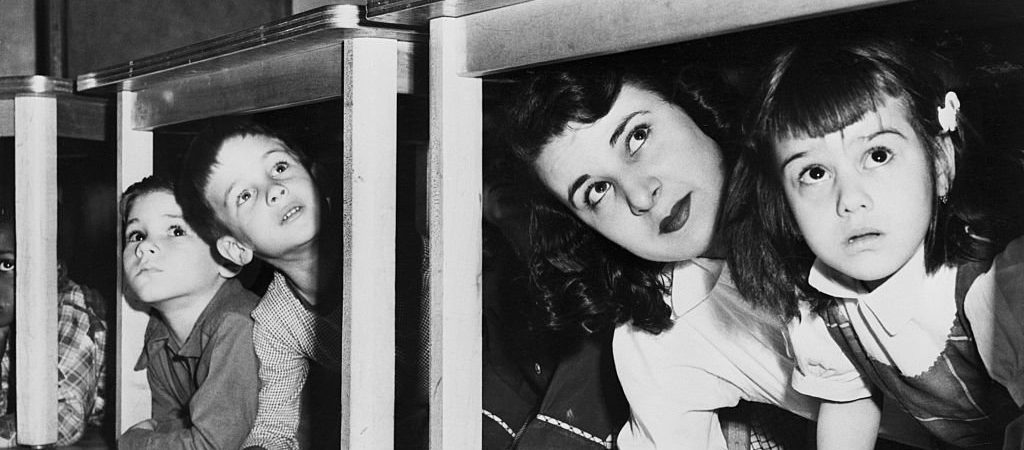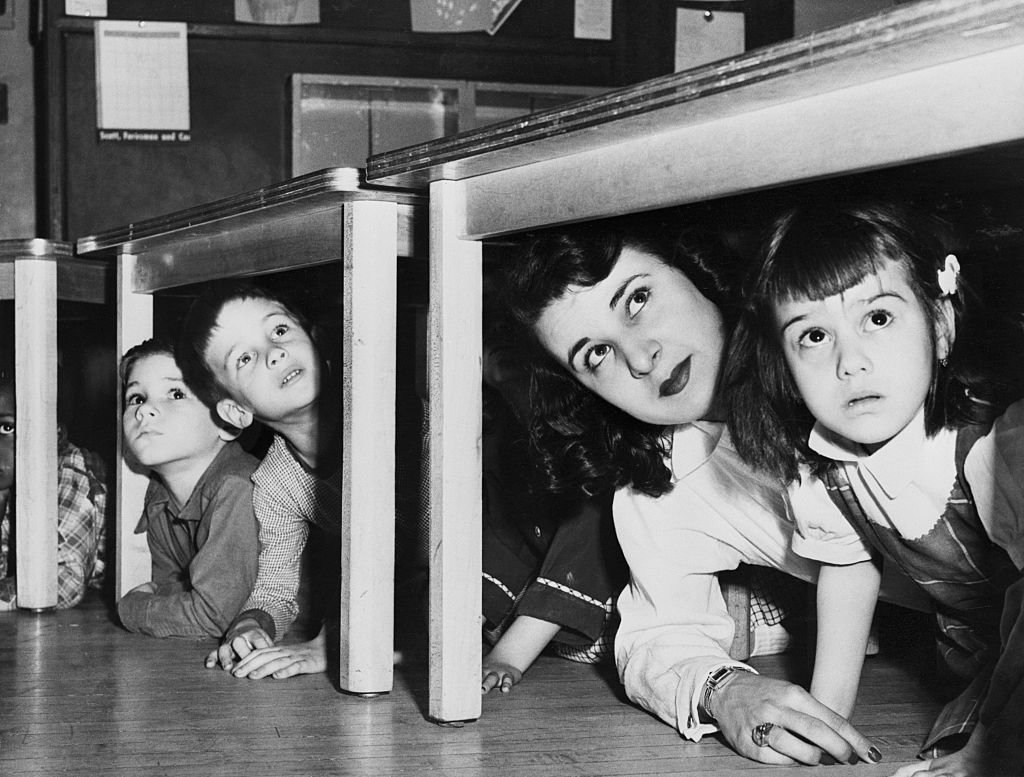What We Tell Children When the World Seems Unsafe

We have to teach the safety drills for our time, summon our often precarious reserves of courage and find our lullabies where we can.

This is about the song my mother used to sing, “Shake Hands With Your Air Raid Warden.” It’s about living through scary times with children, and what you tell them when the world does not seem like a safe place. And of course, it’s about my mother, and maybe about her generation, which certainly grew up through scary times, and about thinking of our own children, all of them, their childhoods interrupted — at any age — by Covid-19 and by our own scary times.
My mother played the bugle. She grew up in the Williamsburg section of Brooklyn, and she marched with her father’s Jewish War Veterans band (he had emigrated from Hungary in time to be sent back to Europe as an American soldier in the First World War). When she worked as a camp counselor in the summer, in the Catskills, she took along her bugle; she played reveille in the morning, taps in the evening, and mess call before meals.
When our family lived in suburban New Jersey, in the late 1960s, my mother would step out on the back porch and play “Mess Call” to summon us home for dinner; that was back in the days before play dates, when children ranged around the neighborhood and parents didn’t necessarily know where they were.
Did that actually happen very often? I’m not even sure; the bugle-on-the-porch was one of my mother’s favorite stories about herself. She loved to imagine herself scandalizing the suburban New Jersey neighborhood, as she blared it out: “Soupy, soupy, soupy without a single bean! Porky, porky, porky without a strip of lean! Coffee, coffee, coffee, the meanest ever seen!” (Surely those were not quite the lyrics when she played for the Jewish War Veterans?)
I grew up in the Vietnam War era, and my mother was deeply opposed to the war — to all wars. Her only brother had died in Korea, and she spent years writing and rewriting a novel about how this devastated her parents, and left her mother willing to spend her meager savings on a fortune teller who assured her that her son was still alive.
Latest Updates: Coronavirus Outbreak
- Wuhan lifts its lockdown, as Europe charts its next moves.
- How doctors and nurses risked everything as the coronavirus tore through northern Italy.
- Britain is gripped by concern for the health of its prime minister, and questions of succession.
See more updates Updated 3m ago More live coverage: MarketsNew York
But she loved the songs of the Second World War. “Praise the Lord and Pass the Ammunition.” “Coming in on a Wing and a Prayer.” “There’s a Star-Spangled Banner Waving Somewhere.” Over time, as I grew up, I tracked many of them down, but there was one that I could never locate, not in collections of the songs of the war, not in YouTube videos.
- Help us report in critical moments.
Subscribe today to support The Times
Then, last week, I was talking (in a properly socially distanced way, of course) with my children about my mother. It was, in fact, the anniversary of her death — something that I had actually forgotten in the confusion and distress and time-lapse blur of the last few weeks. When my children pointed out the anniversary, I of course started to cry, and then tried to say, somewhat incoherently, that my mother, if she were alive, would have been more up to the current crisis than I will ever be.
She knew the world was dangerous, I tried to explain; she learned it as a child, and she accepted it, and she never forgot it. Think about that song, the one about the air raid warden that I could never find, the one I finally decided she must have invented.
And of course, within about 15 minutes, my daughter had found a wartime radio clip in the New York Public Radio archives, and there was the song, “Shake Hands With Your Air Raid Warden.”
Actually, the clip started with a discussion of plane spotting — that is, how civilians could learn to recognize enemy bombers — between the radio host, Clifton Fadiman, and an aircraft expert, Frederick Hazard. Civilian spotters, with their binoculars, Mr. Hazard said, were on the first line of defense against attack from the air.
My mother’s song (as I think of it) was performed by Irving Caesar, who actually wrote it, who lived a long and successful songwriting life; he was born in 1895 and died in 1996, and his songs include the lyrics for “Tea For Two,” with music by Vincent Youmans, and for “Swanee,” with music by George Gershwin. “Shake Hands” was very much the encouraging ballad of civil obedience that the title suggests, swinging along in march rhythm (“Walk up to him and say, Mr. Warden, I’ll obey, just tell me what to do and where to go!”).
I was overjoyed (in the sense of being reduced to tears) to hear this refrain from my childhood sung all the way through. But I was even more affected by the song that Irving Caesar performed first, “When You Hear the Siren Blow,” written specifically as a “safety song” for the children of America. It’s a much less stirring, less brassy song, written in a kind of nursery rhyme pitter-patter.
The first verse told children what to listen for — one long blast and one that’s short — which would let them know that an air raid was happening. It told them what to do — proceed calmly to a shelter.
The second verse was addressed to mothers, warning them that if an air raid came by day, they should stay away from the schools and let the teachers handle things. At night, turn off any lights that might be visible, and keep food and water and a radio handy.
“Mothers, although your hearts may ache, and lots of courage it may take, be brave, it’s for your children’s sake, your courage will see you through,” the song concludes.
As I said, it doesn’t take much to make me cry these days. And I’m not reaching for war metaphors; a pandemic is a pandemic, not a war or a tsunami. It is its own disaster, and must be met and understood as such.
But we can draw generational comparisons to the way the world broke apart around the families of the 1930s and ’40s. And no matter how frightened they might have been, the children in the United States were safer than many; those air raids never came.
What I keep thinking about is the recurring responsibility that parents face in difficult times to acknowledge to our children that no matter how much we would give to be able to do it, we cannot promise them safety, and we cannot promise to make the world go on working. We have to be able to teach whatever safety drills go with our own uncertain times, summon our own often precarious reserves of courage, and find our lullabies where we can.
And we can hope, of course, for better times; my mother was still singing “Shake Hands With Your Air Raid Warden” seven decades later, not as a warning of danger overhead, but as a signifier, perhaps, that troubled times can be survived and remembered, and that song and story can help us through. In the song, you follow your air raid warden all the way to victory; “Shake hands with your air raid warden, hero without gun — a loyal volunteer, we need him over here, until the war is won!”
-
Latest News
-
Top Posts in April



















Comments